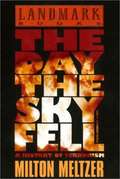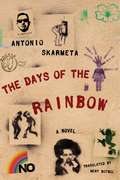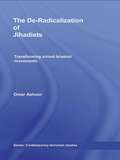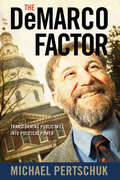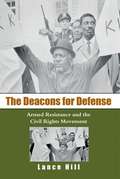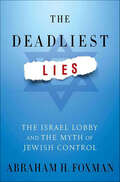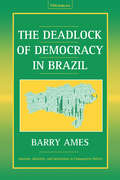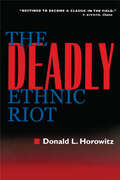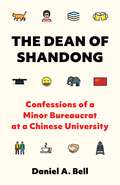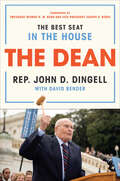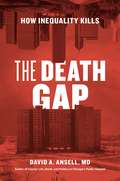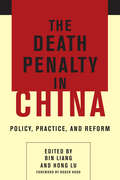- Table View
- List View
The Day the Bozarts Died: A Novel
by Larry DubersteinStanley Noseworthy is, at best, a serial monogamist. At worst, a faithless rake. Now his record-breaking long-term lover ("1001 better-than-Arabian nights") Nina is fed up with his "inimitable bull%#$#" and threatening to end their relationship. "Show us there is some good in you," Stanley's best friend urges. "Show us there is a brain." But Stanley's decisions do not tend to be made by his brain. He has profoundly mixed feelings about losing Nina, for he is nothing if not a profoundly mixed (up) fellow. Stanley is either a dedicated artist or a posturing fraud, a charming rogue or a shallow lothario, tragic victim or pathetic loser--or all of the above. ("Vote Online!" Stanley might well say to this, for he is always prepared to satirize his own life as sharply as the life around him.) Meanwhile, Stanley's beloved artists' cooperative, The "Hotel Beaux-Arts" (hence Bozarts) to its inhabitants, is also under threat. Since its endowment a quarter-century ago by the august Canterbury Institute of Technology, the "Bozarts" has had a frequently glorious, always rambunctious, character-rich history. Lately, mysteriously, it has been dwindling toward extinction. Stanley (who may or may not be paranoid) fears the reason for this is either that the Institute wants its building back for more profitable use, or that George W. Bush has declared an end to Art and Thought in America--or both of the above.
The Day the Sky Fell: A History of Terrorism
by Milton MeltzerWho are terrorists? How do they justify what they do? Award-winning author Milton Meltzer searches for answers as he puts terrorism and its practitioners into historical context.
The Days of the Rainbow: A Novel
by Antonio SkarmetaNico, the son of a noted Chilean philosophy professor, witnesses his father's arrest while he is teaching a class. Bettini, the father of Nico's best friend, is a leftist advertising executive who has been blacklisted and is out of work after having been imprisoned and tortured by Pinochet's police. This doesn't stop the ministry of the interior from asking Bettini, who is the best in the business, to come up with a plan for the upcoming referendum designed to say "yes" to Pinochet's next term. But just hours after he has been approached by the right, the head of the opposition makes him the exact same offer. What is Bettini going to do? Put his life on the line or sacrifice his political convictions? Finally he goes with the left. The next hurdle is finding a slogan that would be approved by the sixteen factions that comprise the opposition and who never agree on anything. Whiskey after whiskey, an idea finally emerges. This is a vivacious tale that examines how advertising and politics come together during the Pinochet regime. But this is also a coming-of-age story where we see through Nico's experience what it means to grow up in a country where nothing is allowed and almost any move can feel like an earnest act of resistance.
The Days to Come: A Novel
by Tom RosenstielA masterful political thriller from the author of Shining City thrusts veteran Washington fixers Peter Rena and Randi Brooks into a dark world of cyberattacks, a new era of foreign espionage, and a risky, classified plan to save the world from environmental disasterBillionaire entrepreneur David Traynor has big dreams for fixing a broken government in his first term as president of the United States. In the months before his inauguration, he’s developed daring and, in some cases, secret strategies to solve the climate crisis, force Congress to work again, and rebuild America’s economy—and that’s just the beginning. Everyone in the capital is scrambling to adapt to the new disruptor in chief’s bold agenda, though many, both at home and abroad, also want to see Traynor and his steely vice president, Wendy Upton, fail. Unsure of whom he can trust, Traynor intends to turn to an unusual group of people to advise him, including the savvy and sometimes ruthless DC fixers Peter Rena and Randi Brooks.Though he is at the height of his career, Rena finds his world in chaos. His personal life is a mess; he wonders if his work—saving powerful people from their mistakes—has become too cynical. When malicious, untraceable cyberattacks related to his past start seeping from the dark corners of the internet, Rena’s doubts overwhelm him. Then an unpredictable tragedy throws the country into crisis, and he must come out of his stupor.If Rena wants to help the new president salvage American politics, he will first have to reckon with his own demons and come to grips with a world far different from the one he once believed in. With the government and the country polarized and on the cusp of enormous change, Tom Rosenstiel’s The Days to Come is a clever, gripping thriller and a cogent meditation on how to heal a divided country.
The De-Radicalization of Jihadists: Transforming Armed Islamist Movements (Contemporary Terrorism Studies)
by Omar AshourThis book is the first detailed study of the causes of de-radicalization in armed Islamist movements. It is based on frontline research that includes interviews with Jihadist leaders, mid-ranking commanders, and young sympathizers, as well as former security and intelligence officers and state officials. Additionally, it is also the first book to analyze the particular conditions under which successful de-radicalization can take place. The current literature on Islamist movements attempts to explain two principal issues: their support of violence (radicalization) and their changing attitudes towards democracy and democratization (moderation). However, the reasons behind renouncing (behavioural de-radicalization) and de-legitimizing (ideological de-radicalization) violence have not been evaluated to date. The author provides an in-depth analysis of the de-radicalization processes of the Egyptian Muslim Brothers (1951-73), former allies of al-Qa'ida, such as al-Gama'a al-Islammiyya (Islamic Group of Egypt, 1997-2002) and al-Jihad Organization (2007- present), as well as of Algerian Islamist groups (1997-2000). The book also analyzes cases of de-radicalization failure. The two questions that the book highlights and attempts to answer are Why? and How? For example, why do radical Islamist militants revise their ideologies, strategies and objectives and initiate a de-radicalization process; and what are the necessary conditions behind successful de-radicalization? De-radicalization of Jihadists shows how a combination of charismatic leadership, state repression, social interactions and selective inducements can ultimately lead jihadists to abandon 'jihad' and de-legitimize violence. This book will be of great interest to students of radical Islamist movements and Islamic Studies, terrorism and political violence, security studies, and Middle Eastern politics. Omar Ashour is a Lecturer in Politics in the Institute of Arab and Islamic Studies, University of Exeter. He has a PhD in International Relations from McGill University in Canada.
The DeMarco Factor: Transforming Public Will into Political Power
by Michael PertschukVinny DeMarco might be a latter-day Don Quixote except that he tilts his lance at real obstacles to social justice: lobby-locked state legislatures and Congress, stonewalling the public will. And he makes impossible dreams come true. In twenty years of organizing campaigns in Maryland, he has led successful efforts to pass gun control laws (against National Rifle Association opposition), to hike cigarette taxes to prevent youth smoking, and to extend health care to hundreds of thousands of low-income workers. He has also built a unique alliance of mainstream and conservative faith groups, which helped secure rare bipartisan votes in Congress for the enactment in July 2009 of landmark FDA regulation of tobacco manufacture and marketing.DeMarco's unique strategic template, developed over two decades of serial campaigning, includes momentum-building stages over a multiyear campaign; unrelenting, skillful access to the media for engaging public support; coalitions of hundreds, even thousands, of faith, community, labor, public health, and business groups; and a hard press on candidates to support legislation before elections, rather than after they are comfortably in office. As an organizer/leader, Demarco also succeeds in his campaigns through force of personality: his unquenchable exuberance and idiosyncrasies delight and madden his opponents--sometimes his allies, too.Michael Pertschuk, himself a veteran advocate, here chronicles three of DeMarco's campaigns, each facing a different obstacle course. His deep analysis draws out strategic and leadership lessons that engaged citizens and advocates for popular causes stonewalled by powerful lobbies can put to immediate and practical use.
The Deacons for Defense
by Lance HillIn 1964 a small group of African American men in Jonesboro, Louisiana, defied the nonviolence policy of the mainstream civil rights movement and formed an armed self-defense organization--the Deacons for Defense and Justice--to protect movement workers from vigilante and police violence. With their largest and most famous chapter at the center of a bloody campaign in the Ku Klux Klan stronghold of Bogalusa, Louisiana, the Deacons became a popular symbol of the growing frustration with Martin Luther King Jr.'s nonviolent strategy and a rallying point for a militant working-class movement in the South.Lance Hill offers the first detailed history of the Deacons for Defense and Justice, who grew to several hundred members and twenty-one chapters in the Deep South and led some of the most successful local campaigns in the civil rights movement. In his analysis of this important yet long-overlooked organization, Hill challenges what he calls "the myth of nonviolence--the idea that a united civil rights movement achieved its goals through nonviolent direct action led by middle-class and religious leaders. In contrast, Hill constructs a compelling historical narrative of a working-class armed self-defense movement that defied the entrenched nonviolent leadership and played a crucial role in compelling the federal government to neutralize the Klan and uphold civil rights and liberties. In 1964 a small group of African American men in Jonesboro, Louisiana, defied the nonviolence policy of the mainstream civil rights movement and formed an armed self-defense organization to protect movement workers from vigilante and police violence. Lance Hill offers the first detailed history of the Deacons for Defense and Justice, who grew to several hundred members and twenty-one chapters in the Deep South and led some of the most successful local campaigns in the civil rights movement. He constructs a compelling historical narrative of a working-class armed self-defense movement that defied the entrenched nonviolent leadership and played a crucial role in compelling the federal government to neutralize the Ku Klux Klan and uphold civil rights and liberties.-->
The Dead Do Not Die
by Adam Hochschild Joan Tate Sven Lindqvist Sarah DeathSven Lindqvist is one of our most original writers on race, colonialism, and genocide, and his signature approach-uniting travelogues with powerful acts of historical excavation-renders his books devastating and unforgettable.Now, for the first time, Lindqvist's most beloved works are available in one beautiful and affordable volume with a new introduction by Adam Hochschild. The Dead Do Not Die includes the full unabridged text of "Exterminate All the Brutes", called "a book of stunning range and near genius" by David Levering Lewis. In this work, Lindqvist uses Joseph Conrad's Heart of Darkness as a point of departure for a haunting tour through the colonial past, retracing the steps of Europeans in Africa from the late eighteenth century onward and thus exposing the roots of genocide via his own journey through the Saharan desert.The full text of Terra Nullius is also included, for which Lindqvist traveled 7,000 miles through Australia in search of the lands the British had claimed as their own because it was inhabited by "lower races," the native Aborigines-nearly nine-tenths of whom were annihilated by whites. The shocking story of how "no man's land" became the province of the white man was called "the most original work on Australia and its treatment of Aboriginals I have ever read . . . marvelous" by Phillip Knightley, author of Australia.
The Dead Eye and the Deep Blue Sea: A Graphic Memoir of Modern Slavery
by Vannak Anan PrumToo poor to pay his pregnant wife's hospital bill, Vannak Anan Prum left his village in Cambodia to seek work in Thailand. Men who appeared to be employers on a fishing vessel promised to return him home after a few months at sea, but instead Vannak was hostaged on the vessel for four years of hard labor. Amid violence and cruelty, including frequent beheadings, Vannak survived in large part by honing his ability to tattoo his shipmates--a skill he possessed despite never having been trained in art or having had access to art supplies while growing up. As a means of escape, Vannak and a friend jumped into the water and, hugging empty fish-sauce containers because they could not swim, reached Malaysia in the dark of night. At the harbor, they were taken into a police station . . . then sold by their rescuers to work on a plantation. Vannak was kept as a laborer for over a year before an NGO could secure his return to Cambodia. After five years away, Vannak was finally reunited with his family. Vannak documented his ordeal in raw, colorful, detailed illustrations, first created because he believed that without them no one would believe his story. Indeed, very little is known about what happens to the men and boys who end up working on fishing boats in Asia, and these images are some of the first records. In regional Cambodia, many families still wait for men who have disappeared across the Thai border, and out to sea. The Dead Eye and the Deep Blue Sea is a testament to the lives of these many fishermen who are trapped on boats in the Indian Ocean.
The Dead Girls' Class Trip: Selected Stories
by Anna SeghersA new translation of the best and most provocative short stories by the author of Transit and The Seventh Cross.Best known for the anti-fascist novel The Seventh Cross and the existential thriller Transit, Anna Seghers was also a gifted writer of short fiction. The stories she wrote throughout her life reflect her political activism as well as her deep engagement with myth; they are also some of her most formally experimental work. This selection of Seghers&’s best stories, written between 1925 and 1965, displays the range of her creativity over the years. It includes her most famous short fiction, such as the autobiographical &“The Dead Girls&’ Class Trip,&” and others, like &“Jans Is Going to Die,&” that have been translated into English here for the first time. There are psychologically penetrating stories about young men corrupted by desperation and women bound by circumstance, as well as enigmatic tales of bewilderment and enchantment based on myths and legends, like &“The Best Tales of Woynok, the Thief,&” &“The Three Trees,&” and &“Tales of Artemis.&” In her stories, Seghers used the German language in especially unconventional and challenging ways, and Margot Bettauer Dembo&’s sensitive and skilled translation preserves this distinction.
The Dead and Those About to Die: D-Day: The Big Red One at Omaha Beach
by John C. Mcmanus<p>An awe-inspiring true account for the 70th anniversary of D-Day. A white-knuckle account of the 1st Infantry Division's harrowing D-Day assault on the eastern sector of Omaha Beach--acclaimed historian John C. McManus has written a gripping history that will stand as the last word on this titanic battle. <p>Nicknamed the Big Red One, 1st Division had fought from North Africa to Sicily, earning a reputation as stalwart warriors on the front lines and rabble-rousers in the rear. Yet on D-Day, these jaded combat veterans melded with fresh-faced replacements to accomplish one of the most challenging and deadly missions ever. As the men hit the beach, their equipment destroyed or washed away, soldiers cut down by the dozens, courageous heroes emerged: men such as Sergeant Raymond Strojny, who grabbed a bazooka and engaged in a death duel with a fortified German antitank gun; T/5 Joe Pinder, a former minor-league pitcher who braved enemy fire to save a vital radio; Lieutenant John Spalding, a former sportswriter, and Sergeant Phil Streczyk, a truck driver, who together demolished a German strongpoint overlooking Easy Red, where hundreds of Americans had landed. <p>Along the way, McManus explores the Gap Assault Team engineers who dealt with the extensive mines and obstacles, suffering nearly a fifty percent casualty rate; highlights officers such as Brigadier General Willard Wyman and Colonel George Taylor, who led the way to victory; and punctures scores of myths surrounding this long-misunderstood battle. <p><i>The Dead and Those About to Die</i> draws on a rich array of new or recently unearthed sources, including interviews with veterans. The result is history at its finest, the unforgettable story of the Big Red One's nineteen hours of hell--and their ultimate triumph--on June 6, 1944.</p>
The Deadliest Lies: The Israel Lobby and the Myth of Jewish Control
by Abraham H. FoxmanThe representative of the Jewish community and staunch defender of human rights, Foxman delivers a powerful blow to such ideas as "The Israel Lobby." He shows how old stereotypes associated with the most virulent forms of bigotry have been resurfacing and taking subtle new forms. From Carter to Mearsheimer, he addresses the public figures who make these beliefs appear credible. He also reveals a disturbing parallel trend: the decline of global Jewish solidarity, which he argues is critical for dealing with the current threat. Foxman advocates forthright and decisive solutions to an international crisis, ensuring that this will be an important clarion call.
The Deadlock of Democracy in Brazil
by Barry AmesMany countries have experimented with different electoral rules in order either to increase involvement in the political system or make it easier to form stable governments. Barry Ames explores this important topic in one of the world's most populous and important democracies, Brazil. This book locates one of the sources of Brazil's "crisis of governance" in the nation's unique electoral system, a system that produces a multiplicity of weak parties and individualistic, pork-oriented politicians with little accountability to citizens. It explains the government's difficulties in adopting innovative policies by examining electoral rules, cabinet formation, executive-legislative conflict, party discipline and legislative negotiation. The book combines extensive use of new sources of data, ranging from historical and demographic analysis in focused comparisons of individual states to unique sources of data for the exploration of legislative politics. The discussion of party discipline in the Chamber of Deputies is the first multivariate model of party cooperation or defection in Latin America that includes measures of such important phenomena as constituency effects, pork-barrel receipts, ideology, electoral insecurity, and intention to seek reelection. With a unique data set and a sophisticated application of rational choice theory, Barry Ames demonstrates the effect of different electoral rules for election to Brazil's legislature. The readership of this book includes anyone wanting to understand the crisis of democratic politics in Brazil. The book will be especially useful to scholars and students in the areas of comparative politics, Latin American politics, electoral analysis, and legislative studies. Barry Ames is the Andrew Mellon Professor of Comparative Politics and Chair, Department of Political Science, University of Pittsburgh.
The Deadly Ethnic Riot
by Donald L. HorowitzDonald L. Horowitz's comprehensive consideration of the structure and dynamics of ethnic violence is the first full-scale, comparative study of what the author terms the deadly ethnic riot—an intense, sudden, lethal attack by civilian members of one ethnic group on civilian members of another ethnic group. Serious, frequent, and destabilizing, these events result in large numbers of casualties. Horowitz examines approximately 150 such riots in about fifty countries, mainly in Asia, Africa, and the former Soviet Union, as well as fifty control cases. With its deep and thorough scholarship, incisive analysis, and profound insights, The Deadly Ethnic Riot will become the definitive work on its subject. Furious and sadistic, the riot is nevertheless directed against a precisely specified class of targets and conducted with considerable circumspection. Horowitz scrutinizes target choices, participants and organization, the timing and supporting conditions for the violence, the nature of the events that precede the riot, the prevalence of atrocities during the violence, the location and diffusion of riots, and the aims and effects of riot behavior. He finds that the deadly ethnic riot is a highly patterned but emotional event that tends to occur during times of political uncertainty. He also discusses the crucial role of rumor in triggering riots, the surprisingly limited role of deliberate organization, and the striking lack of remorse exhibited by participants. Horowitz writes clearly and eloquently without compromising the complexity of his subject. With impressive analytical skill, he takes up the important challenge of explaining phenomena that are at once passionate and calculative.
The Deadly Life of Logistics: Mapping Violence in Global Trade
by Deborah CowenIn a world in which global trade is at risk, where warehouses and airports, shipping lanes and seaports try to guard against the likes of Al Qaeda and Somali pirates, and natural disaster can disrupt the flow of goods, even our &“stuff&” has a political life. The high stakes of logistics are not surprising, Deborah Cowen reveals, if we understand its genesis in war. In The Deadly Life of Logistics, Cowen traces the art and science of logistics over the last sixty years, from the battlefield to the boardroom and back again. Focusing on choke points such as national borders, zones of piracy, blockades, and cities, she tracks contemporary efforts to keep goods circulating and brings to light the collective violence these efforts produce. She investigates how the old military art of logistics played a critical role in the making of the global economic order—not simply the globalization of production, but the invention of the supply chain and the reorganization of national economies into transnational systems. While reshaping the world of production and distribution, logistics is also actively reconfiguring global maps of security and citizenship, a phenomenon Cowen charts through the rise of supply chain security, with its challenge to long-standing notions of state sovereignty and border management. Though the object of corporate and governmental logistical efforts is commodity supply, The Deadly Life of Logistics demonstrates that they are deeply political—and, considered in the context of the long history of logistics, deeply indebted to the practice of war.
The Dealer and the Dead: A Thriller
by Gerald SeymourSometimes surviving a war can almost seem worse than dying in it. A heart-pounding thriller from the bestselling author, the “best spy novelist ever” (The Philadelphia Inquirer).Vukovar, 1991—a small Croatian village near the Serbian border. In a moonlit field, the villagers await an arms shipment they need to make a last-ditch fight against the advancing Serbs. The promised delivery never comes, and the village is overrun.Eighteen years later, a body is unearthed from a field, and with it the identity of the arms dealer who betrayed them. Now the villagers can plot their revenge.In leafy England, Harvey Gillot regards himself a man of his world. There is only one blemish on his record, and that was all a long time ago. But Gillot, his family, his friends and his enemies are about to be pitched into a sequence of events that will unfold across Europe with breathtaking drama and almost biblical power.Harvey Gillot is about to find out what happens when the hand of the past reaches out to the present—and it’s holding a gun.“A war crime propels this stellar thriller from Edgar-finalist Seymour (Harry’s Game) . . . How Seymour develops these characters and manipulates them until they all end up in Vukovar is a testament to his talent and skill.” —Publishers Weekly (starred review)“The final scenes are brilliantly orchestrated by Seymour, the sustained tension becoming almost unbearable . . . Without doubt, The Dealer and the Dead is one of the finest thrillers to be published so far this year.” —Yorkshire Evening Post
The Dean of Shandong: Confessions of a Minor Bureaucrat at a Chinese University
by Daniel A. BellA Financial Times Best Book of the YearAn inside view of Chinese academia and what it reveals about China&’s political systemOn January 1, 2017, Daniel Bell was appointed dean of the School of Political Science and Public Administration at Shandong University—the first foreign dean of a political science faculty in mainland China&’s history. In The Dean of Shandong, Bell chronicles his experiences as what he calls &“a minor bureaucrat,&” offering an inside account of the workings of Chinese academia and what they reveal about China&’s political system. It wasn&’t all smooth sailing—Bell wryly recounts sporadic bungles and misunderstandings—but Bell&’s post as dean provides a unique vantage point on China today.Bell, neither a Chinese citizen nor a member of the Chinese Communist Party, was appointed as dean because of his scholarly work on Confucianism—but soon found himself coping with a variety of issues having little to do with scholarship or Confucius. These include the importance of hair color and the prevalence of hair-dyeing among university administrators, both male and female; Shandong&’s drinking culture, with endless toasts at every shared meal; and some unintended consequences of an intensely competitive academic meritocracy. As dean, he also confronts weightier matters: the role at the university of the Party secretary, the national anticorruption campaign and its effect on academia (Bell asks provocatively, &“What&’s wrong with corruption?&”), and formal and informal modes of censorship. Considering both the revival of Confucianism in China over the last three decades and what he calls &“the Communist comeback&” since 2008, Bell predicts that China&’s political future is likely to be determined by both Confucianism and Communism.
The Dean's December
by Saul BellowAlbert Corde, dean of a Chicago college, is unprepared for the violent response to his expose of city corruption. Accused of betraying his city, as well as being a racist, he journeys to Bucharest, where his mother-in-law lies dying, only to find corruption rife in the Communist capital. Switching back and forth between the two cities, The Dean's December represents Bellow's "most spirited resistance to the forces of our time" (Malcolm Bradbury).
The Dean: The Best Seat in the House
by David Bender John David DingellA candid memoir of the past eighty years in American politics, as told by the longest-serving congressman in historyCongressman John D. Dingell first came to Washington, DC, in 1933 at the age of six, when his father was elected to the Congress, and became a House page boy at eleven. Dingell has devoted his entire life to public service and has witnessed and helped shape most of the important political events that profoundly changed America over the last nine decades. Rife with wisdom born of unparalleled experience and filled with the caustic candor that has made him a living legend on “the Twitter Machine,” The Dean is the inside story of the greatest legislative achievements in modern American history and of the tough fights that made them possible. Here Dingell looks back at his life at the center of American government and vividly describes the political currents that swirled through Congress and the nation. At the age of fifteen, Dingell was in the House Chamber on December 8, 1941, and personally heard President Roosevelt declare it “a date which will live in infamy.” Almost a quarter century later, he presided over the House when Medicare was passed and led the health care reform effort in the House of Representatives from his first term in 1955 through the passage of the Affordable Care Act in 2010, when President Obama invited Dingell to sit at the table when the bill was signed into law. Congressman Dingell worked closely alongside some of the most legendary names in American politics, including Presidents John F. Kennedy, Lyndon Johnson, and Barack Obama; Vice Presidents Hubert Humphrey and Joseph Biden; Senator Ted Kennedy; and House Speakers Sam Rayburn and John McCormack. And though he is a lifelong, proud Democrat, Dingell built lasting bipartisan friendships with Republican leaders such as Presidents Gerald Ford, George H. W. Bush, and George W. Bush, Secretary of State James Baker, and Senator Alan Simpson.And in a scathingly powerful afterword, Dingell addresses our nation’s future in the wake of an unprecedented attack on all our democratic institutions. He presents a persuasive defense of government, reminding us how it once worked honorably and well across the aisle, and offers hope for how it can do so again. By sharing his personal story as a descendant of immigrants, Dingell also reminds us of this country’s founding promise to remain a beacon of liberty to the entire world. The Dean is essential reading for all who love this country as deeply as John D. Dingell does.
The Death Gap: How Inequality Kills
by David A. AnsellWe hear plenty about the widening income gap between the rich and the poor in America and about the expanding distance separating the haves and the have-nots. But when detailing the many things that the poor have not, we often overlook the most critical—their health. The poor die sooner. Blacks die sooner. And poor urban blacks die sooner than almost all other Americans. In nearly four decades as a doctor at hospitals serving some of the poorest communities in Chicago, David Ansell has witnessed firsthand the lives behind these devastating statistics. In The Death Gap, he gives a grim survey of these realities, drawn from observations and stories of his patients. While the contrasts and disparities among Chicago’s communities are particularly stark, the death gap is truly a nationwide epidemic—as Ansell shows, there is a thirty-five-year difference in life expectancy between the healthiest and wealthiest and the poorest and sickest American neighborhoods. If you are poor, where you live in America can dictate when you die. It doesn’t need to be this way; such divisions are not inevitable. Ansell calls out the social and cultural arguments that have been raised as ways of explaining or excusing these gaps, and he lays bare the structural violence—the racism, economic exploitation, and discrimination—that is really to blame. Inequality is a disease, Ansell argues, and we need to treat and eradicate it as we would any major illness. To do so, he outlines a vision that will provide the foundation for a healthier nation—for all. Inequality is all around us, and often the distance between high and low life expectancy can be a matter of just a few blocks. But geography need not be destiny, urges Ansell. In The Death Gap he shows us how we can face this national health crisis head-on and take action against the circumstances that rob people of their dignity and their lives.
The Death Penalty as State Crime: Who Can Kill?
by Laura L. FinleyThis book offers a new perspective on the death penalty in the US, examining capital punishment as state crime or state-produced harm. It addresses the death penalty, showing how the state not only authorizes a system and a practice that tortures human beings, but is also aware of its deep flaws and chooses not to address them.Building on the vast literature on state crime together with case examples and interviews with activists seeking to abolish the death penalty, this book offers a new and innovative critique of state punishment in the US. It draws on a range of issues and topics such as arbitrariness, inadequate counsel, racial bias, mental illness, innocence, conditions on death row, the protocols, and the equipment used for executions. It emphasizes the need for abolition of the death penalty and highlights efforts being made to do so, with a focus on successful elements of abolition campaigns.The Death Penalty as State Crime is essential reading for all those engaged with capital punishment, human rights, and state crime, and will be of interest to criminologists, sociologists, legal scholars and political scientists alike.
The Death Penalty in China
by Hong Lu Roger Hood Bin LiangChina currently leads the world in death sentences and executions, making it a primary target for the global abolition movement. While the results have been subtle, anti-death penalty advocates are beginning to influence Chinese attitudes toward the practice, as well as law. Conducting an interdisciplinary and comparative study of China's death penalty as the country heads toward reform, this book explains what it took to advance reforms to limit death sentences and executions, while identifying the challenges that prevent more extensive progress. Featuring experts from Europe, Australia, Japan, China, and the United States, this collection follows changes in the theory and policy of China's death penalty from the Mao era (1949-1979) through the Deng era (1980-1997) up to the present day. Using empirical data, such as capital offender and offense profiles, temporal and regional variations in capital punishment, and the impact of social media on public opinion and reform, contributors relay both the particular character of China's death penalty practices and the incremental changes that indicate reform. They then compare the Chinese experience to other countries throughout Asia and the world, showing how change can be implemented even within a non-democratic and rigid political system, but also the dangers of pushing policies that society may not be ready to embrace.
The Death Penalty in China: Policy, Practice, and Reform
by Lu Liang Bin HongFeaturing experts from Europe, Australia, Japan, China, and the United States, this collection of essays follows changes in the theory and policy of China's death penalty from the Mao era (1949–1979) through the Deng era (1980–1997) up to the present day. Using empirical data, such as capital offender and offense profiles, temporal and regional variations in capital punishment, and the impact of social media on public opinion and reform, contributors relay both the character of China's death penalty practices and the incremental changes that indicate reform. They then compare the Chinese experience to other countries throughout Asia and the world, showing how change can be implemented even within a non-democratic and rigid political system, but also the dangers of promoting policies that society may not be ready to embrace.

